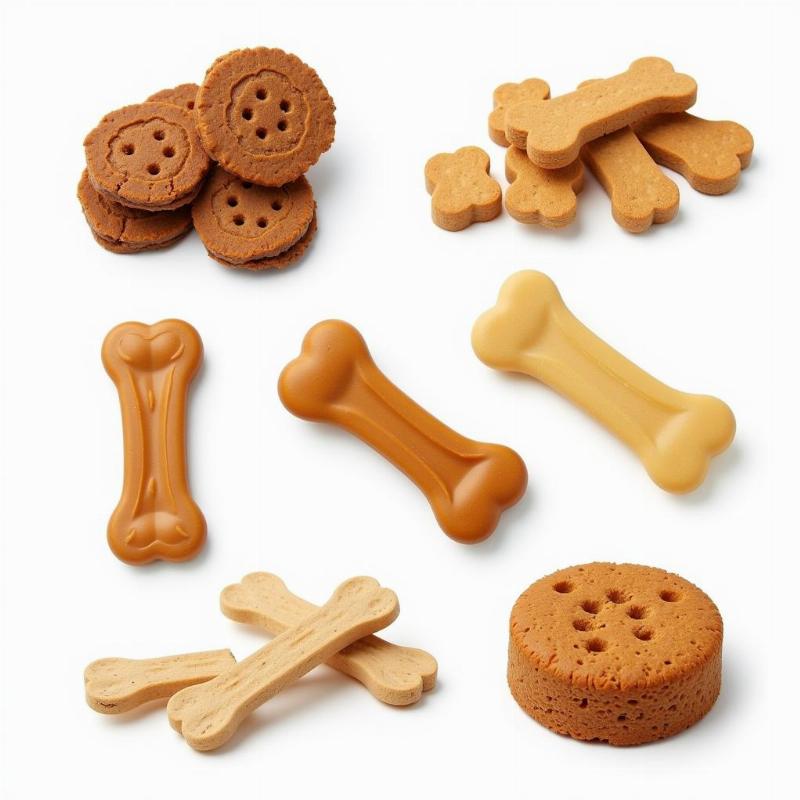Choosing the right dog treats for older dogs is crucial for their health and well-being. As our furry friends age, their nutritional needs change, and so do their physical limitations. Selecting treats that address these changes can help keep your senior dog happy, active, and comfortable in their golden years. This guide will help you navigate the world of dog treats for older dogs, ensuring you choose the best options for your beloved companion.
Understanding the Needs of Senior Dogs
As dogs enter their senior years, which typically begins around seven years of age (though it can vary by breed and size), several physiological changes occur. Their metabolism slows down, making them more prone to weight gain. Joint mobility often decreases, leading to stiffness and discomfort. Dental health can also become an issue, making it difficult for them to chew hard treats. Therefore, choosing dog treats for older dogs requires careful consideration of these factors. Look for treats that are low in calories, easy to digest, and gentle on their aging teeth and gums.
 Dog Treats for Senior Dogs
Dog Treats for Senior Dogs
Key Considerations When Choosing Dog Treats
When selecting dog treats for older dogs, keep these essential factors in mind:
- Ingredient Quality: Opt for treats made with high-quality, natural ingredients. Avoid artificial flavors, colors, and preservatives. Look for treats with whole meats, fruits, and vegetables.
- Calorie Content: Senior dogs are more susceptible to weight gain, so choose low-calorie treats to maintain a healthy weight and prevent obesity-related health issues.
- Digestibility: Senior dogs may have sensitive stomachs. Choose treats that are easy to digest and avoid those with fillers or ingredients known to cause digestive upset.
- Dental Health: Dental disease is common in older dogs. Look for treats that promote dental health, such as dental chews or treats specifically designed to clean teeth and gums.
- Texture: Consider your dog’s dental health and chewing ability. Soft chews, smaller biscuits, or even freeze-dried treats are often easier for senior dogs to manage than hard, crunchy treats.
Types of Treats Ideal for Older Dogs
Several types of treats are particularly well-suited for senior dogs:
- Soft Chews: These are gentle on aging teeth and gums, making them a comfortable and enjoyable treat option.
- Small Biscuits: Smaller-sized biscuits are easier for senior dogs to chew and digest.
- Dental Chews: These treats can help clean teeth and freshen breath, promoting good oral hygiene.
- Freeze-Dried Treats: These single-ingredient treats are often low in calories and easy to digest, making them a healthy and appealing option.
Homemade Treats for Senior Dogs
Making homemade treats allows you to control the ingredients and tailor them to your dog’s specific needs. Simple recipes using ingredients like pumpkin, sweet potato, and lean meats can be nutritious and delicious. Always consult with your veterinarian before introducing new homemade treats to your dog’s diet.
What to Avoid in Dog Treats for Senior Dogs
Certain ingredients should be avoided when choosing treats for your older dog:
- Artificial Sweeteners (Xylitol): Xylitol is extremely toxic to dogs and can cause liver failure.
- High Sodium Content: Excessive sodium can exacerbate health issues in senior dogs.
- Fillers and By-Products: These offer little nutritional value and can be difficult to digest.
- Artificial Colors and Flavors: These can cause allergic reactions or digestive upset.
When to Consult Your Veterinarian
Always consult with your veterinarian before making significant changes to your dog’s diet, including introducing new treats. They can recommend specific treats based on your dog’s individual health needs and any existing medical conditions.
Conclusion
Choosing the right dog treats for older dogs is an important part of providing them with a happy and healthy life. By considering their changing needs and following the guidelines outlined in this article, you can ensure your senior companion enjoys their treats while staying healthy and comfortable. Remember to always consult your veterinarian for personalized recommendations based on your dog’s individual health.
FAQ
- What are the best dog treats for older dogs with sensitive stomachs? Look for single-ingredient, easily digestible treats like freeze-dried meat or plain cooked chicken or sweet potato.
- Can I give my senior dog dental chews every day? Consult with your veterinarian. While dental chews can promote oral health, daily use may not be necessary for all dogs.
- Are homemade dog treats better for older dogs? Homemade treats can be beneficial as you control the ingredients. Ensure recipes are vet-approved and tailored to your dog’s specific needs.
- What should I do if my senior dog has trouble chewing hard treats? Switch to softer treats like soft chews, smaller biscuits, or even a bit of wet food as a treat.
- How many treats should I give my older dog per day? Treats should make up no more than 10% of your dog’s daily calorie intake. Consult your veterinarian for specific recommendations.
- My senior dog has gained weight. What kind of treats should I give him? Opt for low-calorie, healthy treats like small pieces of vegetables or fruits approved for dogs.
- Can I give my senior dog human food as a treat? While some human foods are safe for dogs, many are not. Consult with your veterinarian before giving your dog any human food as a treat.
Related Articles
- can dogs eat steelhead trout
- knit small dog sweater pattern
- dog puffer jacket with sleeves
- treat for one’s dogs crossword clue
Beautdogs.us is your premier destination for all things dog-related in the US. We offer expert advice on dog breeds, care, and product recommendations for a happy, healthy canine companion. Whether you’re a seasoned dog owner or just starting your journey, Beautdogs.us provides reliable resources and insightful content to support you every step of the way. Contact us for personalized support: Email: [email protected], Phone: +1 501-555-7529. Visit Beautdogs.us today!